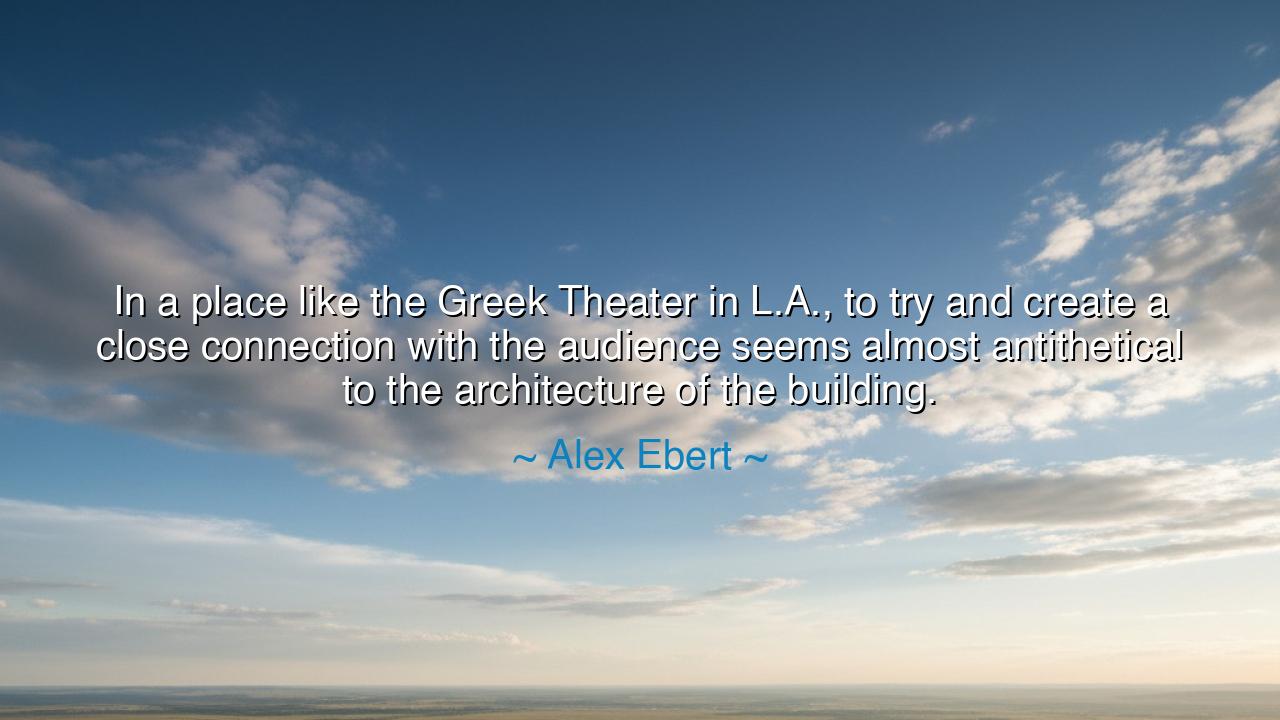
In a place like the Greek Theater in L.A., to try and create a
In a place like the Greek Theater in L.A., to try and create a close connection with the audience seems almost antithetical to the architecture of the building.






Host: The Greek Theatre lay beneath the dark velvet of the Los Angeles sky, a vast open mouth carved into the hillside, its ancient curves echoing the modern hum of anticipation. Lights rippled across the amphitheater, brushing the stone with gold and violet, illuminating the countless faces rising in the tiers like constellations of living stars.
From the stage, the crowd looked endless — an ocean of shadows broken by brief flashes of camera light, glimmering like fireflies trapped in reverence. The air trembled with the prelude of sound checks and whispers, of electricity waiting to bloom.
Jack stood at the lip of the stage, his eyes searching the horizon of bodies. Jeeny sat on a flight case nearby, one leg crossed, her fingers tracing the rim of a coffee cup. The murmur of the crowd drifted up to them like the sound of waves at a distance — powerful, collective, yet unreachable.
Jeeny: (gazing into the darkness) “Alex Ebert once said, ‘In a place like the Greek Theatre in L.A., to try and create a close connection with the audience seems almost antithetical to the architecture of the building.’”
She tilted her head. “He’s right. This place was built to elevate the performer, not to dissolve the distance.”
Jack: (with a half-smile) “Funny, isn’t it? The more magnificent the stage, the smaller the connection.”
Host: His voice carried through the empty air, low and thoughtful, blending with the distant sound of tuning instruments. The moonlight caught the edge of his jaw, the shadow beneath his eyes deep from rehearsal and history.
Jeeny: “It’s the paradox of performance. The bigger the audience, the lonelier the stage.”
Jack: “And the louder the applause, the harder it is to hear yourself think.”
Host: A gust of wind swept through the open air, scattering bits of paper across the stage. Somewhere in the stands, a technician’s flashlight flickered — brief, isolated, then gone.
Jeeny: “Ebert wasn’t just talking about buildings, Jack. He was talking about architecture as metaphor. The way we build walls around the very thing we’re trying to reach.”
Jack: “You mean art?”
Jeeny: “I mean intimacy. The connection between creator and witness. You build the Greek Theatre to amplify art — and in the process, you lose the artist.”
Jack: “Or maybe it’s the price of transcendence. You have to step away from the crowd to be seen at all.”
Jeeny: “But being seen isn’t the same as being understood.”
Jack: “And yet, most people would rather be seen.”
Jeeny: “That’s because they’ve never felt the ache of being misread.”
Host: The sound of the wind shifted, carrying with it faint laughter from the far back rows — technicians testing microphones, calling out names, checking levels. The amphitheater began to come alive, filling slowly with sound and motion, like a beast stirring from sleep.
Jack: “You ever think about what it’s like from their side?”
Jeeny: “The audience?”
Jack: “Yeah. Thousands of strangers looking up, waiting to feel something. Expecting transcendence for the price of a ticket.”
Jeeny: “They don’t come for transcendence. They come for recognition. To find themselves inside someone else’s voice.”
Jack: “And what if the voice is hollow?”
Jeeny: “Then they fill it with their own echoes.”
Jack: (sighing) “You make it sound poetic. I see exhaustion. The artist pouring himself out into a void.”
Jeeny: “No, Jack. The artist becomes the void — the space where everyone else can finally hear themselves.”
Host: The lights dimmed, and for a brief, sacred second, everything fell still. The world held its breath. The Greek Theatre, grand and ancient, seemed to listen.
Jeeny: “That’s what Ebert was really saying. You can’t fake closeness in a place designed for distance. But that doesn’t mean you stop trying. You just change what connection means.”
Jack: “So what does it mean to you?”
Jeeny: “It means resonance. You might not touch every hand in the crowd, but you can make the air between you vibrate.”
Jack: “Resonance. You make it sound spiritual.”
Jeeny: “It is. Music is the only form of prayer that never asks for forgiveness.”
Jack: “And the only one that doesn’t promise salvation.”
Jeeny: “Maybe it doesn’t have to. Maybe being heard is enough.”
Host: The lights flickered again, a technician testing the spotlight. For a moment, Jack was illuminated — alone in its glow, surrounded by shadow. His face softened, caught in the melancholy beauty of exposure.
Jack: “You know, sometimes I think the audience doesn’t come for the performance at all. They come to see if someone else is brave enough to feel what they’re afraid to admit.”
Jeeny: “Exactly. The stage isn’t a separation. It’s a mirror held far enough away to show the whole soul.”
Jack: “So the architecture isn’t the enemy. It’s the test.”
Jeeny: “Yes. Can you build something vast enough to hold thousands of strangers — and still make them believe you’re whispering to them alone?”
Jack: “That’s impossible.”
Jeeny: “That’s art.”
Host: A low hum began to rise — the audience filtering in, voices merging into one great living pulse. The night trembled with possibility. From where they stood, Jack and Jeeny could see the first few rows filling, faces lifting toward the stage like flowers seeking light.
Jeeny: (smiling faintly) “You feel that?”
Jack: (closing his eyes) “Yeah. It’s like standing at the edge of an ocean — knowing it could drown you or carry you somewhere holy.”
Jeeny: “That’s connection. Not closeness, but surrender. The architecture doesn’t block it






AAdministratorAdministrator
Welcome, honored guests. Please leave a comment, we will respond soon